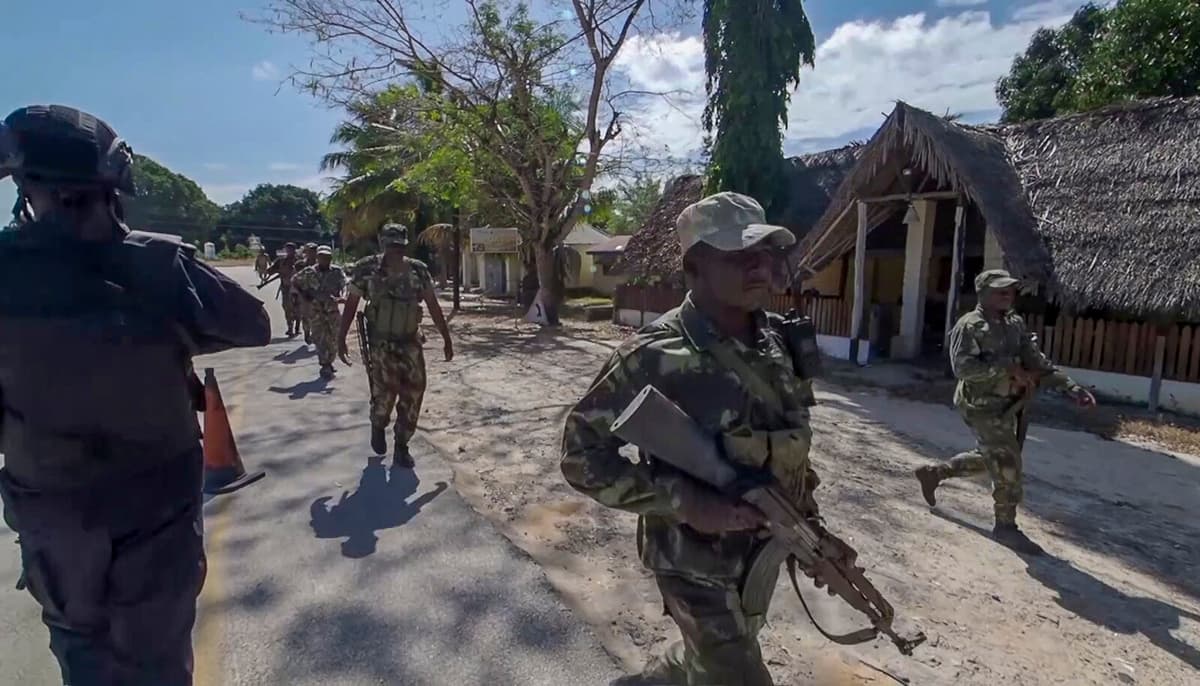"It's time to chop wood."
The prisoners in the metal containers soon learn what the soldiers' code words mean: it's time to execute another group of men. Those selected are taken away with their heads covered by empty rice sacks.
The abuses in Mozambique reported by Politico were committed by soldiers hired by the world's fourth-largest private oil company, Total Energies. Whether the company was aware of what was happening is unclear.
The affected natural gas project was announced in May 2019. Total had bought 26.5 percent and the leading role in a gigantic oil field in a conflict zone on the other side of the globe: in Cabo Delgado (Cabo Delgado) in northeastern Mozambique, which has been the scene of a bloody Islamist uprising since 2017.
We love risks, said CEO Patrick Pouyanné to the think tank Atlantic Council about the megaproject.
Stood in excrement
Total would soon show itself to have underestimated the risks. In March 2021, IS-linked extremists took the town of Palma, killed hundreds, and forced Total to pause operations. Amnesty reported then on gross war crimes committed also by government forces.
A few months later, 180-250 men were locked up in two freight containers at the entrance to Total's giant facility on the Afungi peninsula, just outside Palma, by soldiers from a government force hired by Total to guard the so-called "Totalandia".
The prisoners were civilians who had fled fighting between the army and jihadists, but whom the soldiers claimed belonged to the Islamist group al-Shabab (not to be confused with the Somali group of the same name).
There were no toilets in the containers. The men had to relieve themselves where they stood. With several days' intervals, they received a handful of rice and a bottle cap with water. In desperation, they climbed on top of each other to lick condensation from the ceiling.
People fainted. We couldn't breathe, says 28-year-old Salimo, one of the few who survived, to Politico.
Total denies knowledge
Another describes how it was so cramped that they were forced to stand "like dried fish" in the 30-degree heat. Regularly, the men were subjected to abuse and torture.
One day, 15 of them were taken away to "dig a hole". They never came back. Three days later, the same thing happened to a new group. The procedure was repeated until only 26 were left.
No boy or man will survive, heard 32-year-old Mwanda one of the soldiers say.
All will be beheaded.
Those who survived were released in September 2021, after being discovered by Rwandan military hired to combat al-Shabab. The men and their relatives were "warned" not to talk about what had happened.
Total's man in Mozambique, Maxime Rabilloud, tells Politico that the company is not aware of the abuses.
In May this year, French prosecutors announced that they are investigating allegations against Total Energies for manslaughter in connection with al-Shabab's attack on Palma in March 2021. Relatives of victims and survivors accuse the company of having neglected the risks for its subcontractors in the area.
Cabo Delgado in northeastern Mozambique, near the Tanzanian border, is rich in natural gas, gold, rubies, graphite, and timber, which has made international actors compete for exploitation in the area for a long time.
At the same time, the region has been plagued by extremely violent Islamist uprisings and regular terrorist attacks with many victims. Fighting between the IS-linked jihadist group Ansar al-Sunna – locally called al-Shabab but unrelated to the group in Somalia with the same name – and government forces has raged since 2017.
In 2019, Total Energies launched its giant project in Cabo Delgado, where enormous finds of liquefied fossil gas (LNG) had been made about a decade earlier. To build its facility on the Afungi peninsula, the company forced over 550 families to leave their homes, according to human rights organizations.
To guard the facility, Total hired a special force with around 700 Mozambican government soldiers, commanders, and paramilitary police. Total paid for the force's salaries, accommodation, and equipment.
After being forced to pause operations due to violent unrest in 2021, Total has resumed operations in Cabo Delgado. At the same time, armed extremist groups continue their bloody attacks in the area.






